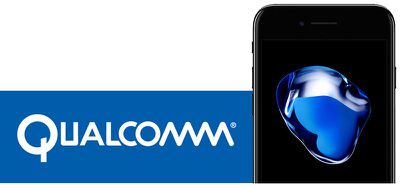Apple and Qualcomm Reach Settlement, Agree to Drop All Litigation
Apple and Qualcomm just kicked off a legal battle over unpaid royalty rebates in a San Diego court, but the case will be cut short as the two companies have reached a settlement.
Apple announced the news in a press release this afternoon. Apple says the settlement includes a payment from Apple to Qualcomm and a six-year licensing agreement for Qualcomm's technologies.

Qualcomm and Apple today announced an agreement to dismiss all litigation between the two companies worldwide. The settlement includes a payment from Apple to Qualcomm. The companies also have reached a six-year license agreement, effective as of April 1, 2019, including a two-year option to extend, and a multiyear chipset supply agreement.
The settlement ends all ongoing litigation between the two companies, including with Apple's contract manufacturers. All companies involved have reached a global patent license agreement and a chipset supply agreement, suggesting Apple may be planning to once again use Qualcomm chips in its devices going forward.
The legal battle dates back to 2017, when Apple sued Qualcomm for over $1 billion in unpaid royalty rebates, accusing the San Diego chip company of anticompetitive patent licensing practices.
Apple in its lawsuit claimed that Qualcomm had "unfairly insisted" on collecting royalties for "technologies they have nothing to do with," while Qualcomm said that its technology is "at the heart of every iPhone. The original lawsuit spawned a bitter legal battle between the two companies, which led to patent disputes and import bans in multiple countries, all of which will now be resolved.
Apple had also stopped using Qualcomm chips in its devices due to the ongoing legal troubles, opting for an all Intel chip lineup in 2018. Recent rumors have, however, suggested that Apple's plans to use Intel's 5G chips for its 2020 iPhones may fall through due to Intel's production delays, which may have been a factor in Apple's decision to come to an agreement with Qualcomm.
Popular Stories
Apple's next-generation iPhone 17 Pro and iPhone 17 Pro Max are just over two months away, and there are plenty of rumors about the devices.
Below, we recap key changes rumored for the iPhone 17 Pro models.
Latest Rumors
These rumors surfaced in June and July:Apple logo repositioned: Apple's logo may have a lower position on the back of the iPhone 17 Pro models, compared to previous...
Apple should unveil the iPhone 17 series in September, and there might be one bigger difference between the Pro and Pro Max models this year.
As always, the Pro Max model will be larger than the Pro model:iPhone 17 Pro: 6.3-inch display
iPhone 17 Pro Max: 6.9-inch displayGiven the Pro Max is physically larger than the Pro, it has more internal space, allowing for a larger battery and...
In 2020, Apple added a digital car key feature to its Wallet app, allowing users to lock, unlock, and start a compatible vehicle with an iPhone or Apple Watch. The feature is currently offered by select automakers, including Audi, BMW, Hyundai, Kia, Genesis, Mercedes-Benz, Volvo, and a handful of others, and it is set to expand further.
Apple has a web page with a list of vehicle models that ...
The calendar has turned to July, meaning that 2025 is now more than half over. And while the summer months are often quiet for Apple, the company still has more than a dozen products coming later this year, according to rumors.
Below, we have outlined at least 15 new Apple products that are expected to launch later this year, along with key rumored features for each.
iPhone 17 Series
iPho...
New renders today provide the best look yet relocated Apple logo and redesigned MagSafe magnet array of the iPhone 17 Pro and iPhone 17 Pro Max.
Image via Majin Bu.
Several of the design changes coming to the iPhone 17 Pro model have been rumored for some time, such as the elongated camera bump that spans the full width of the device, with the LiDAR Scanner and flash moving to the right side.
...
Amazon is soon to be back with its annual summertime Prime Day event, lasting for four days from July 8-11, the longest Prime Day yet. As it does every year, Prime Day offers shoppers a huge selection of deals across Amazon's storefront, and there are already many deals you can get on sale ahead of the event.
Note: MacRumors is an affiliate partner with Amazon. When you click a link and make a ...
Apple's position as the dominant force in the global true wireless stereo (TWS) earbud market is expected to continue through 2025, according to Counterpoint Research.
The forecast outlines a 3% year-over-year increase in global TWS unit shipments for 2025, signaling a transition from rapid growth to a more mature phase for the category. While Apple is set to remain the leading brand by...
Apple is continuing to refine and update iOS 26, and beta three features smaller changes than we saw in beta 2, plus further tweaks to the Liquid Glass design. Apple is gearing up for the next phase of beta testing, and the company has promised that a public beta is set to come out in July.
Transparency
In some apps like Apple Music, Podcasts, and the App Store, Apple has toned down the...
Since the iPhone X in 2017, all of Apple's highest-end iPhone models have featured either stainless steel or titanium frames, but it has now been rumored that this design decision will be coming to an end with the iPhone 17 Pro models later this year.
In a post on Chinese social media platform Weibo today, the account Instant Digital said that the iPhone 17 Pro models will have an aluminum...






















